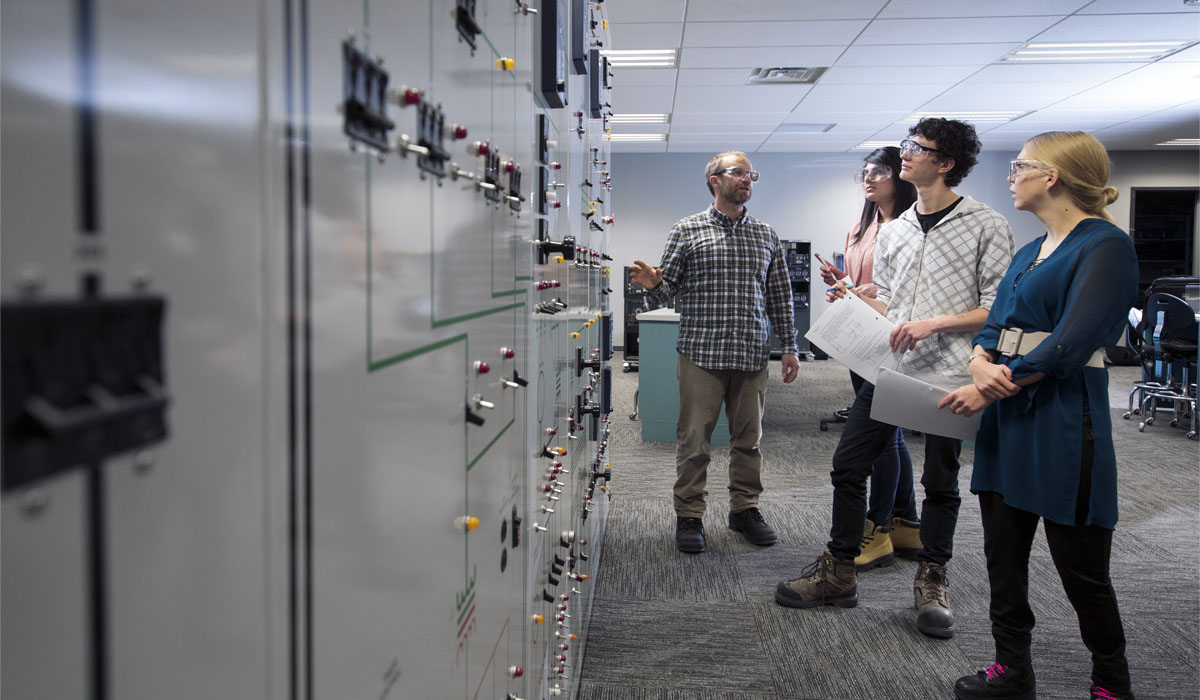Overview
Looking for a hands-on technical career with real impact? Power engineering may be the answer. Certified fifth class power engineers keep critical systems running in hospitals, schools, hotels, commercial buildings, and heating plants. Their work includes operating, monitoring, maintaining, and troubleshooting low-pressure boiler systems and smaller-scale heating plants.
The Fifth Class Power Engineering Certificate of Achievement prepares you for the Alberta Boilers Safety Association (ABSA) Fifth Class Power Engineering exam and certification. ABSA-approved SAIT training and ABSA certification will set you up to become a licensed Fifth Class power engineer in Alberta.
This program combines instructor-guided online learning with hands-on lab experience, providing the technical knowledge and practical skills needed for certification. You’ll meet ABSA's six-month work experience requirement while gaining the skills employers want.
This program is ideal if you:
- are interested in a rewarding career as a Fifth Class Power Engineer, focusing on smaller-scale heating and power systems
- want recognized industry certification for high-demand jobs
- seek hands-on, lab-based training to fast-track your ABSA certification
- need a flexible, part-time learning option.
To be successful in this program, we recommend you have a minimum 50% in Grade 10 Math, English, and Science (Physics). If you haven't completed these courses, consider taking Academic Upgrading courses first.
Upon successful completion of this program, you'll be able to:
- apply knowledge of piping, valves, steam traps, and auxiliary systems to ensure the efficient and safe operation of boilers and mechanical systems
- demonstrate competency in the safe operation, maintenance, and troubleshooting of pumps, compressors, refrigeration, and HVAC systems used in steam and heating applications
- analyze and apply water treatment processes, including raw water preparation and softening, to optimize steam production and system longevity
- operate and maintain various boiler types, combustion systems, and thermal fluid heating technologies following industry safety standards
- interpret and assess boiler designs, fittings, controls, and fuel sources to ensure compliance with operational requirements and energy efficiency
- evaluate and maintain building systems to ensure sustainability and performance, including plumbing, lighting, heating, cooling, and air conditioning controls.
Program outline
To earn this certificate, you must complete the two mandatory courses below. PWEN 003 (theory) must be taken before PWEN 007 (lab). A SAIT Certificate of Achievement is issued only upon successful completion of both courses at SAIT.
The mandatory prerequisite for PWEN 007 may alternatively be met with a course completed at an ABSA-recognized educational institution, provided it aligns with current IPECC curriculum. An official result letter showing your final grade from the education provider is required.
Required courses & electives
How to apply for this certificate
Once you have registered for any course offered in this certificate, you will be automatically eligible to complete the certificate. You will have up to three years to complete this program. You may track your progression by signing in to your Continuing Education student account.
Certifications and professional designations
Upon successful completion of all required courses, you’ll receive an official SAIT Certificate of Achievement and transcript issued electronically.
SAIT will also provide an official result letter for each course completed, which you can submit with your application to write the ABSA Fifth Class certification exam. This exam leads to your ABSA Fifth Class Power Engineering Certificate of Competency — your license to work as a Fifth Class Power Engineer in Alberta.
Power Engineering certification requirements and transfer provisions vary by province and territory across Canada. Check with the regulatory authority where you plan to work:
- Planning to work in Alberta? Contact ABSA.
- Planning to work elsewhere in Canada? Contact the local boiler branch in that jurisdiction.
Costs
This certificate program consists of two courses with varying fees. Please review the individual course pages for this certificate program to determine costs and to learn more about additional learning materials, including textbooks.
Financial support
Financial opportunities are available to help pay for your course fees. Learn more about how to reduce your education or training costs with available awards, bursaries, loans and grants, including the Canada Alberta Productivity Grant.
Careers and opportunities
The training received during this certificate program will be a starting point for a Power Engineering career.
After you have completed both the theory and the lab portion or the equivalent amount of experience required, and you have been certified by ABSA, you may be able to explore career opportunities as a Fifth Class operator in a power plant or heating plant.
Stories and news

Alberta companies look to workforce training to close critical skills gaps
The Southern Alberta Institute of Technology (SAIT) provides corporate training to help businesses boost productivity and workplace performance.

Donor created space enables cybersecurity training for students and industry
The new SAIT Cyber Range creates an immersive cybersecurity training facility for students and industry in downtown Calgary.

Oki, Âba wathtech, Danit'ada, Tawnshi, Hello.
SAIT is located on the traditional territories of the Niitsitapi (Blackfoot) and the people of Treaty 7 which includes the Siksika, the Piikani, the Kainai, the Tsuut’ina and the Îyârhe Nakoda of Bearspaw, Chiniki and Goodstoney.
We are situated in an area the Blackfoot tribes traditionally called Moh’kinsstis, where the Bow River meets the Elbow River. We now call it the city of Calgary, which is also home to the Métis Nation of Alberta.




